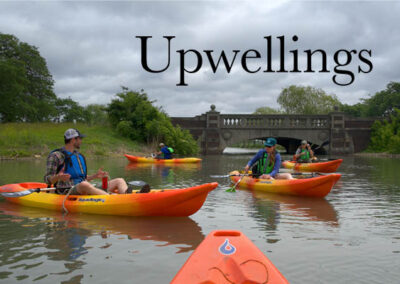
16 Ways Michigan Sea Grant Has Engaged Stakeholders
The heart and soul of Michigan Sea Grant is working with many different stakeholders. The MSG team ensures the work is relevant and useful to stakeholders by conducting needs assessment and constituent surveys and through a variety of other outreach efforts. The following 16 examples were highlighted because they show the scope of MSG’s program.
- MSG has been educating the public about dangerous currents in the Great Lakes by working with natural resource professionals, as well as developing lessons and a web portal that includes NOAA data for decades.
- The Salmon Ambassadors program, developed by MSG, enlisted anglers to gather information on Chinook salmon caught over the course of a year, helping biologists understand how stocked and wild fish contribute to fishing success during the fishing season.
- Twenty teachers from the Lake Huron watershed basin engaged in a week-long experience to explore coastal wetlands and native fish species using robotic tools. Teachers learned how to apply their new Great Lakes knowledge in the classroom.
- MSG worked with a fisheries researcher to develop an online decision-support tool that has educated more than 200 fishery stakeholders about how climate change is likely to affect whitefish populations in the Great Lakes.
- MSG facilitated the Great Lakes Fisheries Heritage Consortium of Michigan museums to broaden the preservation efforts of fisheries artifacts within the state.
- To help charter operations meet food-handling requirements, MSG developed a seafood safety and handling training video based upon the U.S. Food and Drug Administration’s Hazard Analysis and Critical Control Points principles.
- MSG’s leadership and collaboration in the development of a unique lake-to-plate tourism program provided continued economic growth to the state’s charter fishing and restaurant industries, and was recognized by the state tourism industry as innovative and collaborative.
- MSG’s research is helping shape the careers of new professors and transforming the way university personnel collaborate and tackle complex real-world issues through Integrated Assessment research.
- MSG-supported research found that unidentified sources of contamination still exist in the Torch Lake Area of Concern. The project combined environmental engineering and anthropological data to persuade authorities to work together and to address PCB contamination.
- MSG developed a beach safety kit for parks with high incidence of dangerous currents along Lake Michigan to help save lives and create awareness of coastal hazards.
- An MSG research project is helping the Grand Traverse Bay area understand and prepare for the likely impacts of climate change on their water resources, crops and waterfronts.
- MSG developed a tool to address sustainable tourism development for Northeast Michigan. These communities recognize the economic potential of coastal tourism development but also worry about damage that could accompany an influx of visitors.
- Outreach educators from the Great Lakes region participated in a training workshop to learn more about climate change and adaptation tools that could be incorporated into outreach.
- MSG research led to improved water flows in a highly managed river system, and the modeling tools are being used in other similar river systems.
- MSG helped Michigan’s dwindling whitefish industry by supporting development of a cooperative that shifted focus from a single commodity to value-added products and increased earnings.
- MSG worked with fisheries specialists to create an easier-to-read and more engaging version of The Life of the Lakes as a vehicle to build Great Lakes literacy throughout the region.


